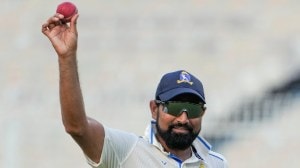A Saraswati Putra who built many Sethus
The October issue of Sahitya Amrut, a Hindi monthly journal published by Prabhat Prakashan to promote good Indian literature...

The October issue of Sahitya Amrut, a Hindi monthly journal published by Prabhat Prakashan to promote good Indian literature, landed on my table and, as always, I avidly turned to the editorial8212; rather, a set of editorial comments on disparate topics 8212; by Dr Laxmi Mull Singhvi.
The first was in great praise of ancient and modern Tamil writers. 8220;When I read Thirukural by Thiruvalluvar, I get the same intellectual thrill as when I read the Mahabharata or Ramayana. Similarly, when I read Jayakanthan who received the Jnanpeeth award for 2002 or Manisekaran Kovi, I have the same ennobling literary experience that I get from reading Premchand, Amritlal Nagar or Agyeya.8221; His second editorial was on his plans to set up a 8216;Global Academy for Vedic Mathematics8217;. Then there was a comment on extra-marital love as portrayed sensitively by some female and male writers in recent Hindi publications.
The last comment was an angry denunciation of the UPA government8217;s affidavit before the Supreme Court denying the existence of Lord Ram. 8220;There can be no other perverse example of such politically motivated insult to the history, culture and ethos of our nation.8221;
8220;Wow, what a learned man!8221; I said to myself, something I have unfailingly done every time I have heard a speech by Dr Singhvi, read his writings, or had a conversation with him. The very next day, on October 6, I read the news on the Internet: 8220;Dr. L.M. Singhvi passes away.8221;
Whenever any person dies, he or she leaves behind a void. But time fills the void, and life moves on. However, when a learned person departs from this world, even time announces its inability, or unwillingness, to fill the void quickly. Perhaps it is nature8217;s way of reminding us of the invaluableness of knowledge and wisdom.
Dr Singhvi was a man of oceanic scholarship. He could speak and write effortlessly about law his first profession, on which he left a deep imprint at a young age, diplomacy he was perhaps the best Indian high commissioner in London, literature he served for many years as chairman of the selection board for the Jnanpeeth award, spirituality an authority on Jainism and all other branches of Indic religions, he made commendable contribution to projecting their essential unity to global audiences, and diaspora issues he was the driving force behind the NDA government8217;s pioneering policy of dual citizenship for 8216;Persons of Indian Origin8217; and institutionalising the 8216;Pravasi Bharatiya Divas8217;.
By describing him as 8216;Saraswati Putra8217;, former prime minister Atal Bihari Vajpayee paid the most appropriate homage to Dr Singhvi.
To present a glimpse of his greatness, let me cite a small excerpt from his 1996 speech at Stanford University, titled 8216;Building Bridges for India through a Global Indogenic Movement8217;. The term 8216;Sethu8217; is very much in discussion these days because of the controversy over 8216;Ram Sethu8217;. But look at the profound sense that Dr Singhvi mined from the word.
8220;Sethu represents a very meaningful metaphor in the treasure chest of India8217;s heritage. Even at the risk of sounding archival, I would like to share with you an adage in Sanskrit, which illumines the functional-teleological range and rationale of building Sethus: Sethubandhanam Sarvaranjanam; Sethubandhanam Margasadhanam; Sethubandhanam Snehakaranam; Sethubandhanam Vihita-taram; Sadabhavyam Sadadivyam; Sadasatyam Sanatanam May bridges be built to secure welfare and happiness of all; to blaze new trails and facilitate passages; for the cause of affection among individuals and groups and for goodwill among nations and peoples; for salvaging that which matters; let this Sethu ever be magnificent and always graced by divine purpose; let it always represent the eternal truths enshrined in the enduring and universal vision of India.8221;
Sadly, Dr Singhvi did not receive full recognition for his multifarious service to the nation. But that did not stop him from continuing to enrich our public life by serving the causes that he held dear, including some that would seem like lost causes. For instance, I cannot think of many persons of his eminence who would take an essentially honorary editorial position at a small-circulation Hindi literary journal as seriously as he did by writing, month after month, 5,000-word comments on issues that the mainstream 8216;national media8217; scarcely bothers about.
He wrote passionately about the need to introduce good Indian writing from one language to another through high-quality translation and publication. He poured out his anguish and anger at the falling reading habits among consumerism-obsessed middle and upper classes in Hindi-speaking states, even describing as 8220;criminal8221; their slumber and passivity in preserving the literary heritage in their mother tongue.
Giving the example of the neglect, both official and popular, towards the birth centenary of Rashtrakavi Dinkar in 2007, he lambasted those in power at the Centre and in Hindi-speaking states for their 8220;cultural illiteracy, apathy and ingratitude8221; 8212;8220;I am sick and tired of reminding them about it.8221;
The void that Dr Singhvi8217;s demise has left behind is a reminder of the many Sethus that we need to urgently build: above all, the one between our feverish pursuit of material wealth and our callous neglect towards the immensely more valuable wealth hidden in the literary, cultural and artistic heritage of every Indian state.
- 01
- 02
- 03
- 04
- 05






























